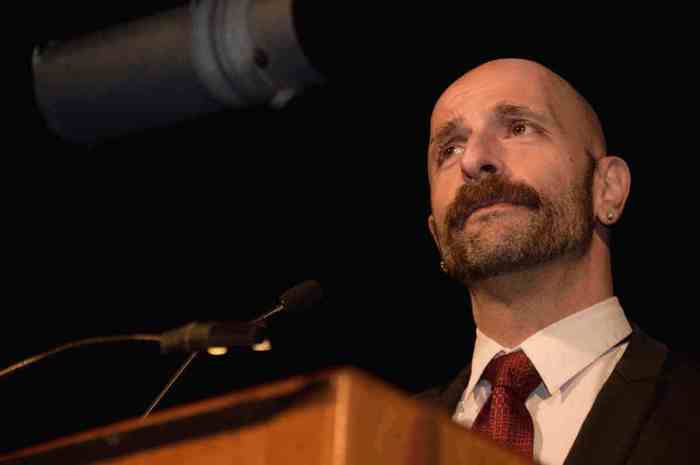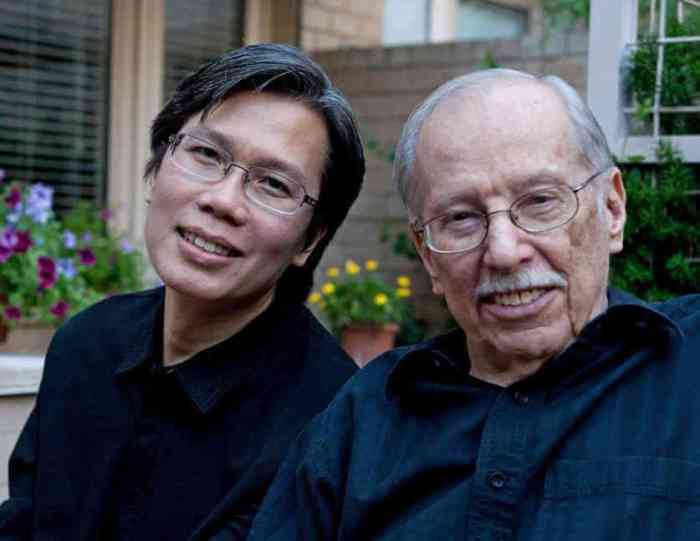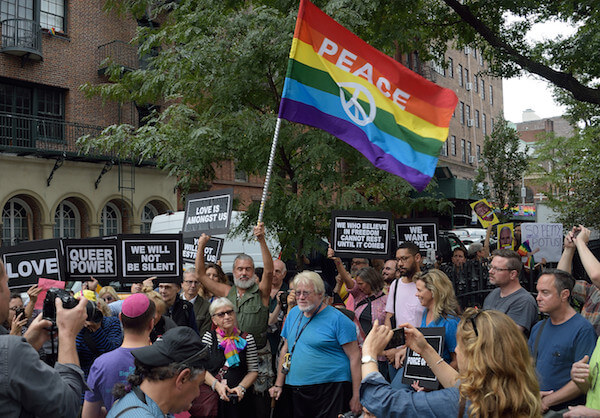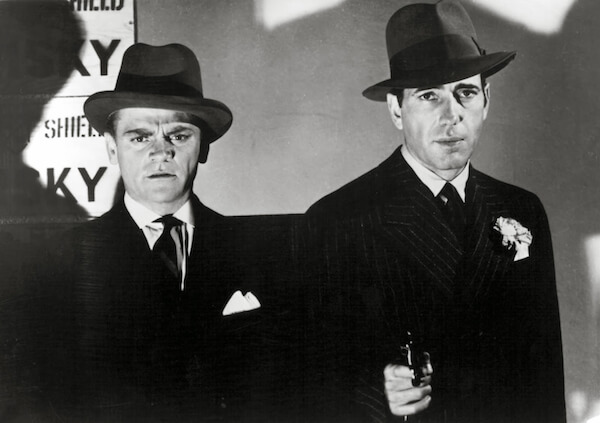Playwright Andy Halliday. | COURTESY OF GLENNA FREEDMAN PUBLIC RELATIONS
Everything just happens to me. I never have had to go after anything,” Andy Halliday told me.
The actor turned playwright is brimming over with excitement these days over the opening of his latest opus, “Up the Rabbit Hole,” which just opened at Theater for the New City (see David Kennerley’s review).
“Yes, this is rather autobiographical, ” the playwright said, settling into a booth at the Hudson Diner, “with a brilliant beautiful young cast, and, yes, there is major nudity in it. It deals with my love for hustlers and a time in my life when I had issues with addiction. During that time, I would invite anyone over, and my thing was, ‘I have drugs if you want to come over and take your clothes off.’ And they weren’t the greatest — quite unsavory characters. One night, I ended up in a very dangerous situation, which I show in the play. It was the worst period of my life, very dark. It lasted about a year and a half — then you either get straight or you die. It was after my play ‘I Can’t Stop Screaming” closed,’ and that’s when everything really went downhill.
“Up the Rabbit Hole” playwright comes clean
“I invited the wrong person home, like ‘Lookin for Mr. Goodbar,’ and it saved my life, as it turned out but he could have killed me. I met him at Don’t Tell Mama, and I lived down the street. I would get high and go there, so we went on this 24-hour binge, got kicked out of the China Club, and wound up at this afterparty in a burned-out brownstone, where he was trying to sell my drugs. It was horrible — I was a mess and I never want to go back.
“I have now been clean and sober since April 22, 1992. I went to rehab and then Cocaine Anonymous, but everyone was so crazy there, I couldn’t stay. So I went to AA — they were quieter there, because cokeheads are trying to come off that and the nerve endings are out.
“Sometimes it takes and sometimes it takes years. Luckily, I got it right away, but I have friends who are in and out of it for years. I remember once I took someone home and when I asked if he wanted to get high, he was horrified and made me feel horrible. Because he rejected me, which was his right to do, but being judged like that was awful. We all have our issues, so I like to never judge.”
Halliday’s play also deals with him, an adopted child, trying to find his biological mother.
“This happened through my biological brother, who found me first. It was when I was doing the play ‘Red Scare on Sunset.’ Jerry had gone to the agency and was told that, strangely, they had never put his file away and that he had a brother — me — and did he want to meet me? We contacted my mother and she denied it at first, but then broke down and allowed us to visit her in Greenville, South Carolina.
“I looked just like her in drag; Charles Busch always said we all look like our mothers in drag. She’d had a rough life, drank a lot, was married but never divorced, and put all her children in a foster care facility. It turned out to be lovely, with her and us and her other children, surrounding her at dinner together for the first time.
Halliday has no idea who his biological father is.
“My mother gave me a story which I kind of don’t buy, about this traveling salesman who picked her up in a bar, which I’m sure is true. They spent a week together in a hotel and one day he took off, taking all her clothes. That’s what she says, but she was drinking so who knows?
“I was adopted by a couple and brought up Jewish, with a lot of upper middle class kids in Orange, New Jersey. We used to do kiddie shows three years in a row, on a stage that was built for us, with my mother, who worked in a bridal shop, giving us costumes. She was a strong, no-nonsense woman who never could stand not knowing all about me. She accused me of being gay before I even knew it. I didn’t date in high school and had no friends except Bobby Halliday, whose name I took professionally.
“My first sexual encounter was with an older man when I was at theater camp. He was in his 30s and a very talented choreographer. It was confusing to me because my very self-involved parents had never told me anything about sex, only ‘brush your teeth and change your clothes.’ I was in therapy since I was a little kid.”
It was at that camp that Halliday met someone who would eventually change his life completely, future playwright Charles Busch.
Peter Gregus and Tyler Jones in Andy Halliday’s “Up the Rabbit Hole,” directed by G.R. Johnson at Theater for the New City through October 15. | KEVIN CRISTALDI
“I came out before him, but did not tell him. We would come into New York City and go to theater class together. We actually met in a production of ‘Brigadoon’ when he was known as Chuck. At first he thought I was stuck-up, or the other way around. He had already been thrown out of camp for fooling around with a girl in the bushes who later became a lesbian. We were 15 in 1970 and one day, after class, we were walking to Grand Central together. He was living with his aunt on Park Avenue and we started talking and became friends. We just clicked and bonded — he was so funny and the audience was crazy for him already, he was so entertaining. I never had a friend like him ever again.
“When he told me in 1984 he had written a role for me in this play ‘Vampire Lesbians of Sodom,’ I thought ‘Ohmigod, that sounds so crazy.’ I was a fully trained dancer [sidelined by an injury] and always wanted to play the boy next door and he had me in fishnet stockings, high heels, and a g-string. I thought, ‘Why not?’ We rehearsed and opened at the Limbo Lounge on First Avenue and 10th Street, and my life changed completely. It was different world back then — the East Village was dangerous. Our lighting person used to push a shopping cart filled with equipment and covered with lights, dressed as a homeless person, to get safely through Tompkins Square Park unmolested, the ground covered in crack pipes. We didn’t know anything — it was all an adventure. Michael Musto wrote about us and we really took off, at the beginning of the East Village scene. All these celebrities came, but I wasn’t too aware of who they were, except I knew that Jo Anne Worley came.”
Busch was to write nine original roles for Halliday, including his annual Christmas appearance in ‘Times Square Angel,’ in which “I played the drunk, the Gladys George role. My favorites were in ‘Theodora, She-Bitch of Byzantium’ and ‘Pardon My Inquisition,’ and, when we went to Off-Broadway, Lotte, in ‘The Lady in Question.’ Halliday’s early career really peaked with that puppy: as a beyond-evil replica of the demonic ‘Bad Seed’ little girl, but with added nasty Nazi urges in Busch’s parody of World War II propaganda films, he was singled out by The New York Times, but found that it was to forever typecast him in the eyes of theater decision-makers.
“Those early plays of Charles’ were so wild and dirty and outrageous. Really fun and out there, with titles like ‘Kiss the Blood Off My Castanets.’ The great thing about his plays is that they’re published and for young queer people; they no longer have to play in something like ‘Desire Under the Elms’ and a girl can play a boy and vice-versa. They offer so much more freedom, which better fits their own special craziness, and they’re so well-crafted. As a playwright I had to find my own voice, but Charles was always so supportive of me and I learned a lot from him. It can be hard to land on an idea and think, ‘Okay I can run with this, there’s just enough of a tear in the paper that I can rip it open.’”
When success hit the company Busch had pulled together, however, there were some rocky times, with ambition, competitiveness, and egos getting in the way. Time has seen such issues nicely resolved.
“I love them all and miss them. Julie Halston was always so funny, loud, charming, caring, and self-involved, everything you want her to be. I just had dinner with Arnie Kolodner, who looks great and is a success, doing his children’s magic act all over the world. What he did for us was very hard to do and that was to be the romantic lead and not get upstaged, but he was so funny and and had that old movie style down pat. Charles discovered him when he was doing a Renaissance Fair in upstate New York and he was doing his magic. He was really beautiful, had a nice body, and was kind of arrogant, which was perfect. Charles handpicked us because each of us had something that corresponded to the way he wrote at that time.”
Quinn Coughlin in Andy Halliday’s “Up the Rabbit Hole,” directed by G.R. Johnson at Theater for the New City through October 15. | KEVIN CRISTALDI
Halliday manages to do his creative thing and hold down a real job — at Broadway Cares/ Equity Fights AIDS — with beautiful aplomb.
“I love Broadway Cares — they’re so good to me and supportive, and what they do is so selfless and giving and kind, supporting people living with AIDS, outreach food programs around the world, sending money to the needy, like Texas, recently. They don’t think twice, and I’m very grateful to be there.
Halliday has been single since his lover Tim died in 1991.
“I don’t mind. It would be nice, I think. I don’t miss it. I like going home and watching what I want to watch and going to sleep when I want to go to sleep. I have odd hours: I get up at four and write and go to work at nine and am in bed by nine. There’s so much going on now with the show, and I’ve started a new play. I believe in never stopping, and then there’s the dog.”
And there are also the 2,000 DVDs that Halliday, a true cinemaniac, owns.
“I just saw ‘Rebecca’ again last night and loved it. My favorite film? I couldn’t possibly pick just one but I love ‘Notorious’ and ‘Shadow of a Doubt,’ ‘Destry Rides Again,’ ‘Coney Island’ with Betty Grable, ‘Murder, He Says’ with Fred MacMurray, ‘The Spoilers’ with John Wayne, Fred Astaire in ‘Easter Parade.’ ‘Dracula’s Daughter’ is one of my favorites, so beautiful with a great music score. It’s a dark fairy tale and like so many horror movies, you have pity for the character because they can’t help who they are. They keep looking for a cure but there is none and they have to deal with who they are, whether in a coffin or a body of assembled parts. They’re loners, who can’t connect with anybody because they’ll kill them. I love discovering old movies and with all these DVDs, I don’t want for anything!”
UP THE RABBIT HOLE | Windowpane Theatre Company | Theater for the New City | 155 First Ave. at 10th St. | Through Oct. 15: Thu.-Sat. at 8 p.m.; Sun. at 3 p.m. | $25 at Smarttix.comor 212-868-4444 | 100 mins., with no intermission





































